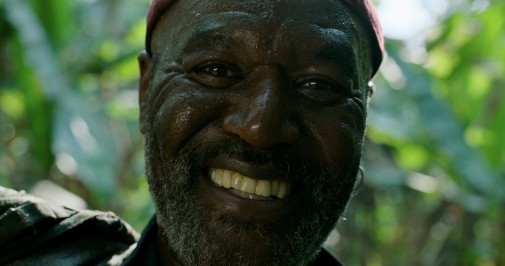
Last week, in the aftermath of the Oscar nominations, I asked you, dear readers, to vote on which performance should get an "Almost There" treatment. Of the fifteen possibilities, your choice was clear – Delroy Lindo in Spike Lee's Da 5 Bloods. He got nearly a quarter of the votes, and so, here we are, ready to dissect an achievement that, months ago, seemed like a sure bet in the Best Actor race. The role in question is that of Paul, a war veteran who, along with his brothers in arms, returns to Vietnam in search of a lost treasure and the remains of a mentor…
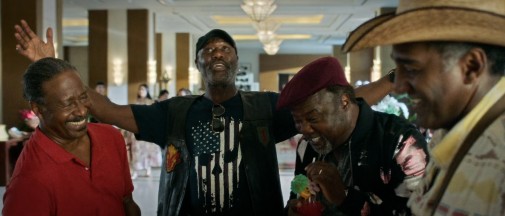
From his first scene, Delroy Lindo announces the creation of a complex portrait whose loudness shouldn't be confused for lack of nuance. Paul enters the film in a flurry of theatrical bravado, greeting his old friends with open-armed exuberance. It's been years since they've been together, and the land they find themselves in is full of memories, both bad and good, nostalgia and terror holding hands. His bonhomie notwithstanding, a glimpse of his fallen comrade, Stormin' Norman, in an old photograph is enough to cut through the joie de vivre.
A pained silence falls over the aged soldier, a shot of pensive mournfulness twisting his visage into a sculpture of dolorous serenity. Still, before the scene is over and the friends depart to their hotel rooms, Paul regains his bombast as he demands to pay for his stay, rejecting the charity of a wealthy friend. Instead of joy, it's bruised pride which shines in these exaggerated gestures and expressions. In some ways, it's almost as if Paul took the first chance he saw out of his grieving funk, performing outrage as a way to banish whatever despondency had taken hold of his heart.
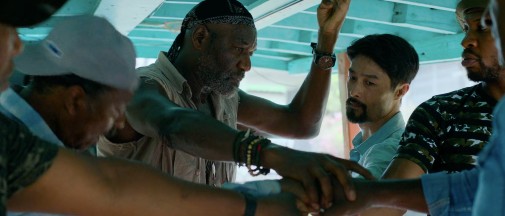
Throughout the movie, Lindo will return to this strategy, to this rejection of outward vulnerability by the foregrounding of his short-temper. Despite this, whenever the painful past is brought up in conversation, Lindo's Paul deflates. After the initial shock of traumatized reminiscence, he might punctuate the scene with a burst of rage. However, we have already seen the mental wounds. We have glimpsed the bloody scars which have never fully healed. By illustrating the struggle to hide, Lindo makes us pay more attention to what's hidden.
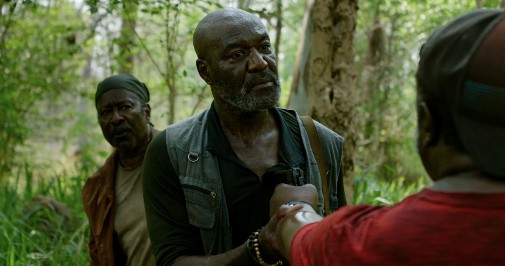
Such odd alchemy of emotional clarity is of the utmost importance, considering what a prickly character Paul is. To the actor's great valor, he never tries to make him more sympathetic. Instead, Lindo sharpens the edges and highlights the abrasiveness of the role. This Trump-supporting man is a live-wire, a ball of rage ready to burn anyone who comes too close for comfort. His humanity isn't illuminated by downplaying such characteristics but by acting them to the hilt. Accordingly, Lindo interprets all of Paul's alienating facets with fearless vigor, daring us to look away and demanding we understand what lies beneath the surface.
It's not an easy task for the viewer to understand. Paul can be vicious, and the impulse to recoil from the screen is never too far away. For example, we can witness a tormented viciousness in how Paul treats his son in early scenes. Still, such paternalistic ugliness, calling the progeny an anchor chained around his father's neck, is a necessary set up for a later surprise. When Paul is forced to confront the possibility of his boy's destruction, the actor changes strategies. Lindo lets us sense the panic of the patriarch, the sweaty fear, the stink of despair emanating from the screen.
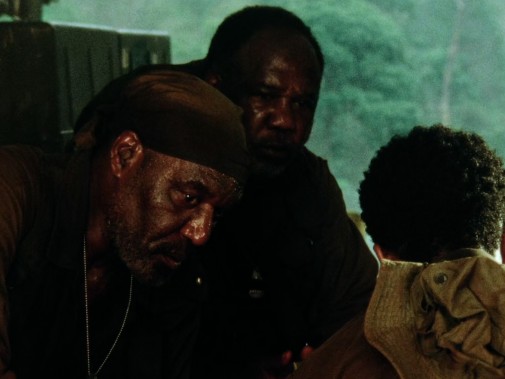
Before going too far down that road and focusing on the last act of Paul's tragedy, we should look back. Spike Lee decided to forego digital de-aging or recasting for budgetary reasons and maybe some artistic chutzpah when presenting flashbacks to the Vietnam War. That means Lindo and his fellow cast members have to evoke their characters' youth through nothing but their acting ingenuity. In the leading man's case, that manifests in the sense of nervous energy running through the scenes, an insecurity that's not wholly visible in the present portions of the narrative. One registers the unsureness of a young man in the way Paul shows reverence to Norman..
His reaction to Martin Luther King Jr.'s death, announced on Vietnamese radio, is also a fascinating thing to behold. By this point in the long movie, we're so used to seeing Paul explode in rage that his young despondency comes off as surprising. Even as four of the five bloods demand vengeance in the face of Norman's stoicism, Lindo's Paul is the one to exhibit less conspicuous fury. The man's ability to mask vulnerability with wrath hadn't been perfected yet, not at that point. For a performance so marked by big moments, Delroy Lindo is equally impressive in quieter scenes.
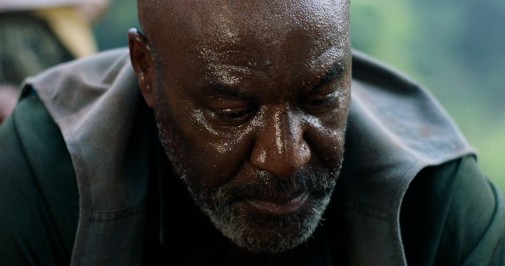
Lee's recurring player knows how to illustrate the festering trauma of Paul, the coagulated guilt, the chains around the man's heart. The balance between levels of showmanship is always precise, even if the mercurial nature of the character might make one doubt the actor's discipline. The best example of this is the solemn discovery of Norman's remains. It's a devastating spectacle, where Lindo foregoes his usual bombast to reveal a softer side of Paul, one that's overwhelmed by guilt, ravaged by loss. In this instance, he's almost gentle, aching with grief as he regards his fallen brother's bones with reverence.
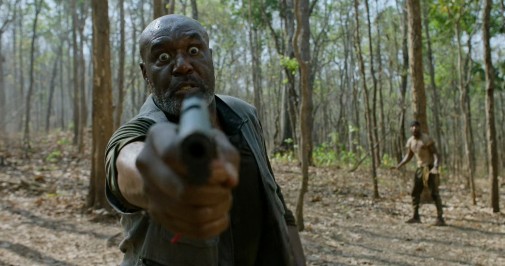
After that funereal discovery, when a mine explodes, the entire tone of Da 5 Bloods irrevocably changes, and Lindo's performance changes with it. What had been simmering under a barely controlled façade gets revealed, and Paul goes completely mad, his capability to hide his interiority disappearing at q quick pace. As the grip on reality slips through Paul's fingers, the actor allows himself moments of dazed confusion. We feel his mind unraveling even as the man shouts orders with a gun in hand. Authority and helplessness dance together, a frightening choreography bound to end in doom. It's a testament to Lindo's mastery as an actor that the veteran's transformation never comes off as forced.
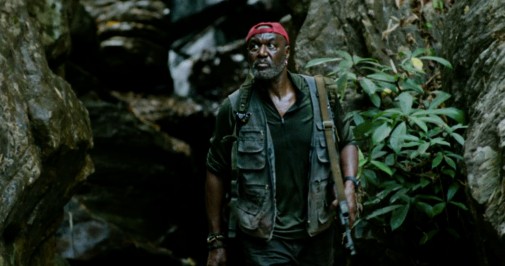
Watching Paul lose himself to the hauntings of the past, to the hatred that has birthed out of guilt, is legitimately frightening. As he rejects his son and heads alone into the jungle, Lindo acts as if nothing's holding him back, like the last connections between his spirit and his reason have been severed at long last. He screams to the heavens, spits viperous words at the camera, and considers the audience as if we were his last confessor. One almost wishes to stand up and applaud the screen, so brilliant his Lindo's direct-address soliloquy. However, what follows maybe even more impressive.
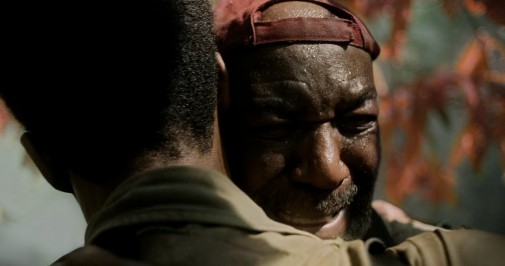
On the precipice of his end, Paul finds a path towards atonement. While feverish, he's self-aware, capable of seeing his actions for what they are, acknowledging the monster he has become in the eyes of his friends, his son. In one heartfelt hug between brothers-in-arms, he even seems to find salvation. Lindo plays the moment with overwhelming beauty, a redemptive torrent of emotion that sets the screen ablaze with tears. After that meeting with a ghost, a memory, we understand Paul is ready to die. He has found peace and, while singing to his executioners, the old soldier appears looser than we've ever seen him. Weight was taken off his back, the end has come, and he embraces it. What a miraculous performance!

Since we're still living through this particular awards season, I won't go into too much detail. Lindo got a lot of positive buzz and considerable critical support, but the advent of the televised awards was his downfall. Da 5 Bloods wasn't embraced by the industry like many expected, and the actor ended up with only a Critic's Choice nomination in terms of big precursors. Instead of Lindo, AMPAs chose to honor Riz Ahmed in Sound of Metal, Chadwick Boseman in Ma Rainey's Black Bottom, Anthony Hopkins in The Father, Gary Oldman in Mank, and Steven Yeun in Minari. Do you think Lindo should have been included over some of those men? I sure do.
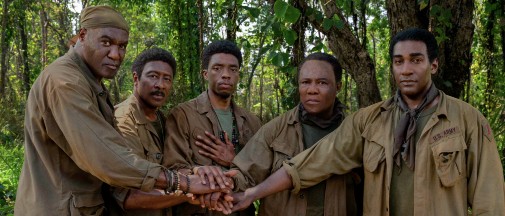
Spike Lee's Da 5 Bloods is streaming on Netflix.